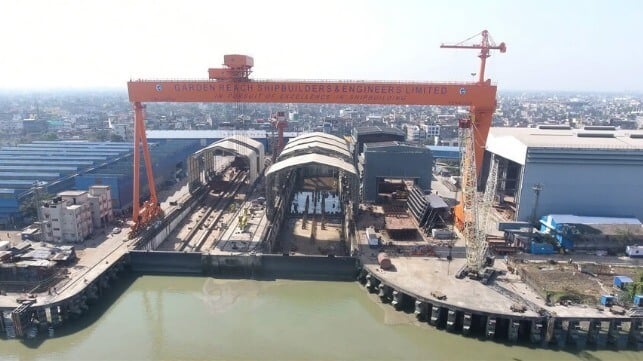India’s Shipyards Attract European Orders as They Seek Global Role

As demand for global shipyard capacity rises, the Indian shipbuilding industry is seeking to attract more work from European shipowners. With the support of the Indian government, the industry is positioning for an expanded role in the global shipbuilding market.
Last week, the state-owned Garden Reach Shipbuilders (GRSE), under the Ministry of Defense, entered into an agreement with the German firm Carsten Rehder for the construction of four multi-purpose vessels each 7,500 dwt. The contract also includes an option for building another four ships. This order represents an important pivot for GRSE which is historically known for the construction of warships.
The vessels will be 394 feet (120 meters) long and 56 feet (17 meters) wide with a maximum draft of approximately 22 feet (6.75 meters). Each will have a capacity to carry 7,500 metric tons of cargo. Further, the vessels will have a single cargo hold each to accommodate bulk and general cargoes, with the capacity to carry containers on the hatch covers. The order is worth $54 million and is scheduled to be completed in a competitive 33 months.
The Indian government has identified domestic shipbuilding as critical in promoting the country’s industrialization ambition. Since 2016, the government has been implementing the Shipbuilding Financial Assistance Policy, which is designed to offer domestic shipyards subsidies of up to 20 percent for contracts signed in 2016 but scaled back to 11 percent by 2026. The policy has been recently amended to include financial assistance for the construction of green vessels, with rates as high as 30 percent for vessels running on alternative fuels such as methanol and ammonia.
To further raise the incentives, the government this year is reportedly planning to roll out an extra $600 million for the shipbuilding financial assistance scheme. The funding will be part of a new viability gap funding (VGR) scheme to incentivize the construction of inland vessels, with a future option of extending it to the building of sea-going vessels.
These initiatives are facilitating most government-owned shipyards to take up more orders of commercial vessels. Early this month, the Goa shipyard, under the administrative control of the Ministry of Defense, received an order for a next-generation trailing suction hopper dredger from the Belgium company Jan De Nul. The vessel is a plug-in hybrid specifically designed to operate in small harbors.
While this contract is for one vessel, with a delivery period of 24 months, there is an option to construct a second vessel. In commenting about the contract, Goa Shipyard Chairman and Managing Director B.K Upadhyay said that this deal with a European client marked a significant step towards diversifying into the global commercial shipbuilding market. Goa shipyard is currently known for its exports of defense platforms from India.
Meanwhile, Udupi Cochin Shipyard, a wholly-owned subsidiary of the state-controlled Cochin Shipyard, on Friday announced it received an order from Norway’s shortsea liner shipping company Wilson ASA. The deal includes the design and construction of four 6,300-ton dry cargo vessels. The company also added that an agreement is in place for an additional four vessels of the same type, which will be formally contracted by September 19, 2024. The total order is estimated at $131 million.

that matters most
Get the latest maritime news delivered to your inbox daily.
Currently, India has less than one percent share of the global shipbuilding market, which is largely dominated by China, South Korea, and Japan. Replacement of aging fleets is a top concern for most shipowners, specifically in Europe which is implementing some of the toughest maritime environmental regulations. The growing orders from European shipowners are however helping India as it vies for a top position in the industry. According to local media reports, European shipowners have so far placed orders worth $750 million at Indian shipyards.
